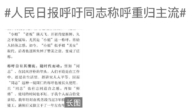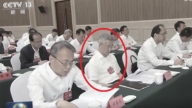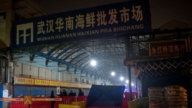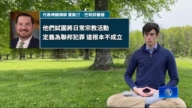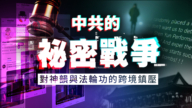【新唐人2014年04月05日讯】日前,中共国务院宣布了一个支出方案,包括建设新铁路和地铁,建廉租房和小企业减税。外媒认为,这些措施是在中国经济放缓的情况下,中共为了维持代表国民生产总值的GDP数字好看,而采取的刺激方案。不过专家们指出,这些措施不但不能解决问题,还可能引发信贷泡沫。
4月2号,中共国务院总理李克强主持召开国务院常务会议,他表示,中共政府推出了驱动今年中国经济稳增长的三轮子政策,其中包括减轻小微企业税负,加快棚户区改造,和加快铁路建设,尤其是中西部铁路建设。
美国《华尔街日报》认为,这些措施是因为今年三月中国制造业和地产行业进一步下滑,迫使中共领导人做出的艰难抉择,报导说,最新推出的经济刺激措施蕴藏的信息是,经济增长的重要性大于对信贷泡沫的担忧。
经济评论专家马杰森:“棚户区改造,无非就是城镇化过程,有经济能力搬到城里的,早已经搬到城里了,有房地产需求的一、二线城市,棚户区改造,基本上都已经完成了,边远的城市本身现有的房地产都消化不了,基础产业—铁路公路已经不是制约中国经济发展的主要因素了,再投资的话,已经是为了投资而投资了。”
目前,在房地产的疯狂投资和扭曲发展下,中国已经出现12座鬼城。它们分布在内蒙古鄂尔多斯附近、和辽宁营口、江苏常州、湖北十堰、昆明呈贡等三线城市,遍及中国各地。
那么扩大小微企业所得税优惠政策,这种看似催生市场内生动力,让利于民的方案能奏效吗?
马杰森:“中小型企业减税已经喊了很多很多年了,不但没减,而且负担越来越严重,现在随着中国经济的放缓,地方政府一定会受到负面影响,房地产泡沫逐渐的要爆掉,也会使得地方政府的土地财政受到很大的威胁,地方政府这个时候缺钱,它绝对不可能再去砍断税收这个财源。”
“北京天则经济研究所”副所长冯兴元曾经对《新唐人》表示,地方政府债务压力大时,除加强乱收费外,还会要求企业,今年把明年的税收等费用先交上来。
目前各项数据显示,中国经济在放缓。汇丰发布的3月份中国制造业采购经理指数为48%,创8个月新低。投资增长则创下近6年来新低;而消费品零售总额,创下了2009年以来新低;出口也大大低于去年同期水平;房地产销售、铁矿石价格、铜价都出现了大幅下跌;港口铁矿石、钢铁和煤炭库存则大幅提高;企业违约、地方债务和产能过剩,都使宏观经济承受压力。
北京大学光华管理学院博士生导师王建国:“总体而言,我觉得短期刺激还是必要的,但是解决不了根本问题,根本问题是要放松管制,必须把权控市场经济变成一个自由竞争的市场经济,经济问题才可以改变。因为管制和贪腐是一对孪生兄弟,如果你又不放松权控,又去反贪,经济就会死。”
“北京大学光华管理学院”博士生导师王建国教授指出,目前中国面临两难,不反腐,民怨太大,而反腐,又使官员们失去动力,当前的反腐使中国的很多行业萧条。
另外,业界担心,在货币发行已经达到110多万亿元人民币,超过GDP将近两倍的大背景下,这次刺激经济会不会再次依赖货币措施。
王建国:“中国目前经济不活跃,不流通,印出来的票子就变成了死钱,像水变成了冰一样。再把票子往里面加,一旦经济回暖,就会出现经济泡沫,就会出现金融危机。”
而国务院常务会议提出的“向邮政储蓄等金融机构筹资,鼓励商业银行、社保基金、保险机构等,参与棚区改造及基础设施工程建设”,这些用来解决棚户区改造资金短缺问题的方案。《华尔街日报》质疑,最终会导致类似于美国、欧洲的泡沫破裂,制造大衰退。
采访编辑/刘惠 后制/李智远
China Trapped In Dilemma To Stimulus Economy
The Chinese Communist Party (CCP) State
Council has announced it‘s program of spending.
This includes the construction of new railways and subways,
building low-cost housing and small business tax cuts.
Foreign media believe that in facing an economic
slowdown, the CCP is adopting stimulus measures.
It is acting in order to maintain a good GDP number.
However, experts point out that these
measures cannot help solve the problem.
They may also lead to a credit bubble.
Narrator:
On April 2, CCP Premier Li Keqiang
hosted a State Council executive meeting.
He said that the CCP government has launched a three
prong policy to drive steady economic growth during 2014.
This includes reducing small business enterprise
taxes, accelerating rebuilding of shantytowns,
and also accelerating railway construction.
These plans will especially effect
central and western railways.
The Wall Street Journal reports that CCP leaders
are being forced to make these tough decisions.
This is because of further declines in the
manufacturing and real estate industry.
The report says the hidden message from these recent
stimulus measures is the importance of economic growth
is greater than concerns over an impending credit bubble.
Ma Jiesen, China economic expert: “The rebuilding of
shantytowns is nothing more than a process of urbanization.
Those who have the economic
ability have moved to the cities.
In those first or second-tier cities, rebuilding
of shantytowns has basically been completed.
In those outlying cities, existing housing cannot be consumed.
As to basic industry; railways and highways are no longer
the main factor which restricts economic growth in China.
If the CCP invests more, it’s only
investing for the sake of investing.”
Currently, under irrational investment and development
of real estate, there have appeared twelve ghost towns.
They exist throughout China, including in Ordos, Inner
Mongolia, Yingkou in Liaoning Province, Changzhou
in Jiangsu Province, and Shiyan in Hubei Province.
So can it work to expand small business enterprise
income tax preferential policies, which seem to stimulate
raw power within the market and benefit the people?
Ma Jiesen: “They have been calling for small
and medium enterprises tax cuts for many years.
However, not only it is not reduced, but also
the situation has become more and more serious.
Now with economic decline, local governments are affected.
If this real estate bubble bursts, local
government revenue will be severely affected.
When the local governments are short of money, they will
definitely not cut another revenue source of SME tax.”
Feng Xingyuan, Vice-Deputy Director of the Beijing
Tianze Economic Analysis Institute commented to NTD.
When local governments have the pressures of
big debts, in addition to strengthening arbitrary
charges, they will also require the enterprises to
hand in their taxes and expenses for the next year.
Currently a variety of data shows that
China’s economy is slowing down.
HSBC released a March China Manufacturing
Purchasing Manager’s index as 48%.
This is the lowest in eight months. Investment
growth reached the lowest in the last six years.
The total retail sales of consumer goods
is the lowest on record since 2009.
Exports are significantly lower
than the level it was a year earlier.
Real estate sales, the price of iron ore
and cooper have all declined sharply.
Iron ore, steel and coal stocks have increased
a lot, and corporate defaults, local debts and
overcapacity all add pressure on macro economy.
Wang Jianguo, tutor, Guanghua School of
Management, Peking University: “Overall,
I think the short-term stimulus is necessary.
However, it cannot solve the fundamental problem.
The fundamental problem is regulation; it
has to turn a controlled market economy
into a market economy with free competition.
As control and corruption sit hand in hand,
if you are neither relaxing control, nor fighting
corruption, the economy cannot survive.”
Wang Jianguo also highlights that
currently China is facing a dilemma.
If they do not implement anti-corruption
initiatives, people will continue to become angry.
If they implement anti-corruption, government officials will
lose power, so many industries now exist under depression.
In addition, professionals worry that, the currency
issue has reached more than 110 million RMB.
This is more than double the GDP, and this economic
stimulus may depend on monetary measures.
Wang Jianguo: “The Chinese economy
is not currently active and circulated.
The printed money has become
dead, like water becoming ice.
If they print more money, once the economy improves,
there will be an economic bubble and financial crisis.”







